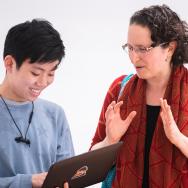Albert Bendelac, the A.N. Pritzker Distinguished Service Professor of Pathology at the University of Chicago, died at his home on Aug. 23, surrounded by family. He had recently celebrated his 67th birthday.
Known for his passion for immunology, his mentorship of students and young faculty, and his broad scientific thinking, Bendelac joined the faculty in 2002 as an established investigator. His research had already demonstrated that CD4 and CD8 T cells were required for the development of type-1 diabetes and had described a novel subset of T cells that expressed Natural Killer cell antigens (NKT cells), discovering CD1d as their restricting element.
“There is little doubt that he remained the leader in the field of NKT cell biology,” said Vinay Kumar, the Lowell T. Coggeshall Distinguished Professor of Pathology and Chair Emeritus.
Bendelac’s seminal discovery came in 1995 when he first described NKT cells in the journal Science, and later in 2005, finding that lysosomal glycosphingolipid ceramide is the natural ligand for NKT cells. More largely, he explored the fundamental question of thymic selection of innate lymphocytes, and in 2008 identified the transcription factor PLZF as the master regulator of NKT, MAIT, and ILC development. In his final years of research, he expanded his work to mucosal IgA B cells. He published more than 100 papers, several of which are cited more than 1,000 times.
Colleagues from across the country remembered Bendelac’s rigorous approach and contributions to the field.
Marco Colonna, the Robert Rock Belliveau Professor of Pathology and Immunology at Washington University, said, "I always admired Albert for his genius, unwavering experimental rigor, and fearless approach to exploring new frontiers in immunology. His upfront and uncompromising nature made him a true and authentic person."
Jason Cyster, Professor of Microbiology and Immunology and Howard Hughes Investigator at the University of California San Francisco, said: "I was always inspired by the quality of his work. His insights into innate lymphocytes were truly ahead of their time."
In addition to his groundbreaking research on lymphocyte biology, Bendelac made immeasurable contributions toward establishing UChicago’s Committee on Immunology as a home of leading-edge, multi-disciplinary research and a premiere training program for young scientists.
Colleagues cite his Advanced Immunology course, which was widely regarded by many trainees as the most demanding and rewarding course of their graduate tenure, and which set the standard for other COI instructors. His Immunobiology course for undergraduate students, the first step in the Concentration on Immunology, was very popular and uniformly highly rated.
Daria Esterhazy, Assistant Professor of Pathology, was recruited by Bendelac to UChicago in 2018 as part of his successful efforts to recruit junior faculty in immunology. “As of 2019, he shared an entire floor of a building unit with me and the other assistant professor recruits, Dr. Andrew Koh and Dr. David Zemmour. It was Bendelac’s initiative to install such an immunology floor and move himself from another space for the sake of fostering a new generation of independent investigators,” she said.
“He was incredibly invested in and supportive of the next generation of immunologists, from undergraduate teaching, to conceiving of the graduate teaching curriculum in immunology, to recruiting multiple junior faculty members and helping them thrive.”
The former chair of the COI, Bendelac received multiple awards throughout his career, including the Quantrell Teaching Award for Excellence in undergraduate teaching in 2019. At the time of the award, he explained that immunology is an incredibly complex field, and the amount of information students have to process can be daunting. Bendelac said the key to keeping undergraduates engaged as he introduces them to the field is to convey this complexity without overwhelming them with details.
“You don’t want to turn them off. You want to excite them and inspire them,” he said. “My mission is to cover all the key aspects of the field but not go into excruciating detail, like knowing the music but not necessarily all the words.”
It was an award that his wife, Bana Jabri, the Sarah and Harold Lincoln Thompson Distinguished Service Professor of Medicine and current chair of the Committee on Immunology, won in 2017. Colleagues described the two as a formidable team, working in different areas of immunology and together helping establish UChicago as a center of excellence in immunology.
“Albert had a vision of scientific excellence that was deeply infectious – he challenged and inspired others to dig deeper both conceptually and technically,” said Peter Savage, Associate Professor of Pathology. “He had high expectations of his colleagues and trainees and led by example. I never saw him flinch or hesitate to tackle a problem, or to put in the hard work necessary to do so. Ultimately, this made an indelible impression that was inspiring to many of us.”
Bendelac earned his medical degree from University Paris VI in 1985, and his Ph.D. in immunology from University Paris VII in 1992. From 1994-2002, he was an associate and then assistant (tenured) professor of molecular biology at Princeton University, and before that was a visiting fellow and then visiting scientist at the National Institutes of Health.
Outside the lab, he enjoyed morning runs with his border collies along Lake Michigan, movies (particularly European cinema), literature, good food and wine, and he was an excellent cook.
In addition to his wife, he is survived by his children, Aude, Raphaëlle and Julien.
There will be a memorial service on Oct. 21.
This story originally appeared on the Biological Sciences Division website.
